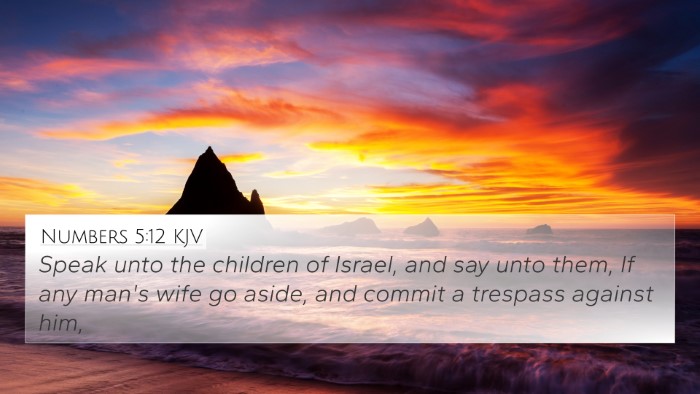Understanding Numbers 5:20
The verse Numbers 5:20 states: "But if you have gone astray, being under the
authority of your husband, and you have defiled yourself and have lain with a man other than your husband, you are cursed, and the water that brings a curse will go into your bowels, and it will make your belly swell, and your thigh rot; and the woman shall say, Amen, Amen." This verse appears in a larger context describing the ritual of the bitter water, which serves to resolve suspicions of infidelity.
Summary of Commentary Insights
Various public domain commentaries shed light on the deeper meanings embedded within this verse. Below is a consolidated interpretation:
-
Matthew Henry's Commentary:
Henry emphasizes the seriousness of the vows taken in marriage and the implications of breaking them. He details that this verse signifies the severe consequences of adultery, illustrating both physical and spiritual repercussions. It serves as a reminder of faithfulness and the gravity of moral obligations within a marriage.
-
Albert Barnes' Notes:
Barnes provides a contextual view of the verse, explaining that the 'bitter water' was a means of divine trial to reveal the truth regarding a woman's fidelity. He notes that this was not just about punishment, but about demonstrating God’s authority over the covenant of marriage and ensuring that justice and order were upheld within the community.
-
Adam Clarke's Commentary:
Clarke takes a more analytical approach, discussing the cultural context of the time. He explains that this procedure, although peculiar to modern ears, was a necessary means of dealing with suspicions that could disrupt social harmony. Clarke emphasizes that the burdens of sin carried serious implications, reflecting God’s justice and the sanctity of marital vows.
Cross-References and Thematic Connections
To understand this verse holistically, one can cross-reference it with several related scriptures that deal with themes of fidelity, judgment, and the sanctity of marriage. Below are noteworthy connections:
- Exodus 20:14: "You shall not commit adultery." – A direct commandment regarding fidelity.
- Proverbs 6:32-33: "He who commits adultery lacks sense; he who does it destroys himself..." – Highlights the consequences of infidelity.
- Matthew 5:27-28: Discusses how lustful thoughts are tantamount to adultery.
- John 8:4-5: The story of the woman caught in adultery emphasizes mercy and accountability.
- Hebrews 13:4: "Let marriage be held in honor among all, and let the marriage bed be undefiled..." – Stresses the sanctity of marriage.
- 1 Corinthians 6:18: "Flee from sexual immorality..." – Encouraging purity and commitment in relationships.
- Malachi 2:16: "For I hate divorce, says the Lord..." – Emphasizes the seriousness of marital commitments.
The Importance of Cross-Referencing
This verse, much like others, gains depth when analyzed through the lens of cross-referencing. By linking Bible verses that discuss similar themes, one can unveil a tapestry of biblical wisdom that guides moral conduct and spiritual discernment.
Tools for Bible Cross-Referencing
Utilizing tools for Bible cross-referencing can greatly enhance understanding. Some resources include:
- Bible concordances for locating related scriptures.
- Bible cross-reference guides that help in thematic study.
- Bible reference resources that compile verses on specific topics.
Implementing Cross-Referencing in Study
To effectively engage in Bible cross-referencing, consider these methods:
- Identifying connections: Look for recurring themes and teachings across both the Old and New Testaments.
- Comparative studies: Analyze how different biblical writers addressed similar topics.
- Thematic explorations: Focus on specific themes, such as fidelity, and collect verses that reinforce or contrast these ideas.
Conclusion
Numbers 5:20 invites readers to reflect on the institution of marriage, the consequences of infidelity, and the importance of fidelity in relationships. Understanding this verse within its broader scriptural context through effective cross-referencing and comparative analysis enriches one’s spiritual journey. Becoming well-versed in these connections allows for a deeper grasp of biblical teachings and their application to everyday life.



